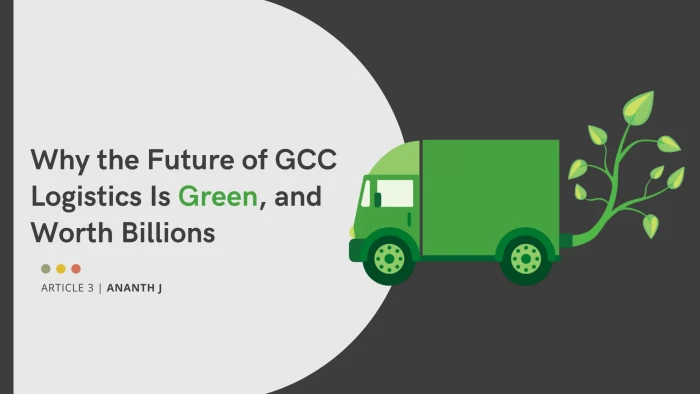The Gulf Cooperation Council (GCC) region is witnessing a transformative shift in its logistics sector, with sustainability becoming a cornerstone of operations. The sector's market size has reached USD 109.0 billion in 2024 and is projected to grow to USD 171.0 billion by 2033, demonstrating a robust compound annual growth rate (CAGR) of 5.10%. This remarkable growth, coupled with increasing environmental awareness, has made the integration of green initiatives essential for long-term success and environmental responsibility in the region's logistics sector.
Factors Promoting Sustainability in GCC Logistics
The transition towards sustainability in GCC logistics is driven by multiple factors, including significant economic potential. Research indicates that by embracing sustainability and implementing corresponding national policies, GCC countries could unlock more than $2 trillion in economic growth. This economic incentive has catalyzed widespread adoption of sustainable practices across the sector.
Digital Transformation
The GCC logistics sector is accelerating digitalization to improve accuracy, responsiveness and agility. The tech innovations are also contributing to sustainability. Cloud computing and big data analytics are being implemented to boost operational efficiency, while IoT devices are integrated for smarter resource management. Further in the upgrades are automation, robotics and advanced transportation technologies. AI-powered route optimization is helping reduce fuel consumption, and Transportation Management Systems (TMS) are streamlining logistics planning. Additionally, blockchain technology is being utilized to improve supply chain transparency.
Government Support and Regulatory Framework
GCC countries have launched strategic plans like Saudi Arabia's Vision 2030 and the UAE's Green Agenda 2030, focusing on sustainable transport and infrastructure development.
The governments are playing a pivotal role in promoting sustainable logistics through robust policy initiatives and investments. Comprehensive regulatory frameworks for renewable energy projects, ESG reporting mandates for public companies, and incentives for adopting energy-efficient technologies underscore their commitment.
The UAE, for instance, has launched numerous initiatives under its Science, Technology, and Innovation Higher Policy, focusing on sustainable energy and transport solutions. Similarly, Qatar's National Vision 2030 (QNV2030) provides a strategic framework that emphasizes sustainable development, aiming for 18% renewable energy generation by 2030.
Infrastructure Development
Significant investments are being directed toward building sustainable infrastructure across the GCC. This includes the expansion of transport networks that incorporate environmental considerations, the development of green ports and logistics hubs designed for energy efficiency, and the implementation of carbon-neutral initiatives such as hydrogen filling stations. These efforts are aimed at creating a resilient and environmentally responsible logistics ecosystem for the future.
Impact of Green Initiatives on Operations
The implementation of sustainable practices has led to measurable improvements in greener footprints while providing significant cost savings. Companies that integrate environmental, social, and corporate governance (ESG) priorities into their growth strategies consistently outperform their peers, delivering higher total shareholder returns and revenue growth.
Saudi Arabia and the UAE are investing heavily in solar energy, with projects like DP World's solar power initiative in Dubai aiming to generate significant clean energy and reduce CO2 emissions.
The UAE plans to have 42,000 EVs on its roads by 2030, and Saudi Arabia has introduced its first LNG-powered tanker, showcasing a commitment to reducing reliance on fossil fuels.
Economic Benefits of Sustainable Logistics
The economic case for sustainable logistics is compelling, with market research indicating substantial growth potential. The sustainable finance market is projected to reach approximately $617,966.6 million by 2030, with a remarkable CAGR of 24.5% from 2025 to 2030. Companies excelling in ESG initiatives while maintaining strong growth and profitability achieve better financial performance, delivering 2 percentage points of annual total shareholder returns above companies focused solely on financial metrics.
Consumer behavior further reinforces the economic benefits of sustainability. Studies show that products with ESG-related claims account for 56% of all growth in certain consumer categories, with over 60% of consumers willing to pay a premium for sustainable products. This consumer preference creates a strong business case for sustainable logistics practices.
Challenges to Implementing Green Practices
Despite the opportunities, the sector faces significant environmental challenges. The transportation sector accounts for a substantial portion of CO2 emissions, with the logistics industry contributing significantly to the region's environmental footprint. The integration of sustainable practices requires substantial initial investments and infrastructure development, which can be a barrier for many organizations.
The need for standardized regulations and clear frameworks presents another challenge. However, GCC governments are actively working on ensuring that their economic diversification efforts are climate-friendly, which should help establish more consistent guidelines for sustainable practices in the logistics sector.
Future Outlook for Sustainable Logistics in the GCC
The GCC logistics sector's commitment to sustainability is driving significant positive change, supported by strong economic indicators and government initiatives. The outlook for sustainable logistics in the GCC remains promising, driven by emerging trends and innovations. The adoption of electric and alternative energy vehicles is on the rise, alongside deeper integration of AI and machine learning to further reduce emissions. The growing e-commerce sector is also propelling the demand for eco-friendly last-mile delivery solutions, paving the way for a greener and more efficient logistics ecosystem in the region.
As technology continues to evolve and sustainability becomes increasingly critical, the GCC logistics sector is well-positioned to lead the way in implementing environmentally responsible practices while maintaining its position as a global logistics hub.
Sources:


